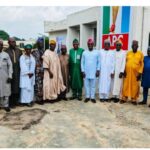By Victorson Agbenson, with Ive Glu
Retired General Muhammadu Buhari campaigned on the three main pillars, the fight against corruption, ending insecurity and revamping the economy.
Winning the 2015 election was therefore an opportunity for him to actualise his campaign promises which included infrastructural development.
For many Nigerians, the emergence of the retired general as a civilian president in 2015 brought a breath of fresh air as the nation grappled with serious security challenges at the time.
Under him, security greatly improved as the administration neutralized many Boko Haram commanders, bomb making scientist and eliminated several collaborators.
The capacity of the military was significantly boosted through the purchase of hardwares and enhanced general fighting capacity.
A University Lecturer, Professor Huud said the administration tried its best to deliver on the three pillars of its target.
“The administration ensured that it fought insecurity to a stand still, many Boko Haram commanders were liquidated, their bomb makers were naturalised, there were also efforts to reposition the economy . Don’t forget that the previous administration of Dr. Goodluck Jonathan was in dire strait, borrowing heavily to pay salaries”
His government fought the perennial menace of corruption by strengthening anti corruption agencies like the economic and financial crimes commission, EFCC, the independent corrupt practices and related of fences commission, ICPC amongst others.
This fight saw the repatriation of stolen funds and assets from countries such as The United state, the united arab emirate UAE, Switzerland and others, in Addition to many recovered assets in-country.
Under the administration strides were also made in the agriculture sector with the Central Bank funded Anchor Borrowers programme which provided over Three Billion naira in funding to farmers, and boosted productivity for over three million small holder farmers.
This complemented the presidential fertilizer initiative and the special agro processing zones created across the country that served to train Nigerians in skills.
A farmer, Mr. Gukas panan Says access to fertilizer under the Buhari regime gave him higher yield
“Before the Buhari administration, I never got government fertiliser, but I was able to get during the Buhari government and it helped to increase my yields greatly”
In terms of infrastructure, notable projects such as the second Niger bridge, the Lagos Ibadan expressway among several other road projects contributed to easing transportation across the country while also enhancing socio economic life .
The social investment programme of the adminstration saw the creation of the N-power scheme which provided opportunity for many youths to obtain skills for self reliance.
The school feeding programme boosted school enrollment and created employment for many, Just as the survival fund gave grants to over eight hundred thousand beneficiaries including artisans and MSMEs.
A chieftain of the ruling All Progressives Congress APC, Comrade Okpoku Ogenyi said Buhari’s social intervention programme was a revolution of a sort.
“Buhari was a great party administrator, a straight forward leader and forthright. His school feeding programme and other similar interventions helped to lift the standards of the common man and suffering masses. Buhari will be remembered as a compassionate leader indeed. I will really miss him”
Former Plateau State Focal Person for the Social Investment programme, Dr Sumaiya Hamza said the programme achieved its aims.
Critics of the Buhari administration hinge their arguments on his three pillar policies, but many agree that under him, Nigeria’s image improved in the global community as his anti corruption stance improved the country’s image in the comity of nations, thereby attracting investors.
In Education, the administration dedicated over two trillion naira to capital intervention in tertiary institutions through the tertiary education trust fund, TETFUND.
It is also credited with the creation of over thirty higher institutions including the army university Biu, Federal university of transportation Daura, among many others.
In the power sector, the Buhari government pursued a massive metering programme that rolled out meters nationwide within on-grid communities.
There was also a targeted incremental four thousand megawatts of electricity which saw the revamping of power generating assets such as the zungeru and kashimbila, hydro stations as well as the Afam three and Kaduna power plants.
The administration was notable for some strides in governance as signing the Not Too Young To Run Bill into law provided an opportunity for many young persons to aspire to political office.
Nigeria’s economy is predicated on oil revenue, and For long the sector had seen controversies owing to policies which did not find implementation. The signing of the petroleum industry bill into law by the administration helped in the ongoing repositioning of the oil and gas sector.
Today, the famous Dangote refinery which has brought a new lease of life to the sector has brought ease to Nigerians as it brought further deregulation of the industry.
While many may speak of the inability of the Buhari administration to attain some of its ideals and promises, one thing they cannot take from the late President was his avowed sincerity, incorruptibility and general love for the fatherland.
This posture earned him respect and admiration from many Nigerians. Some of them who spoke with Radio Nigeria lamented that it would be difficult to get another leader in the mould of the late General .
During his first foray in power as a military head of state, his war against indiscipline campaign was a national awakening as it rightly identified Indiscipline as a major national malaise, and sought to correct it.
As it stands, late President Buhari is the second longest serving President after President Olusegun Obasanjo, having ruled from 1983 to 1985 and from 2015 to 2023.
The man Muhammadu Buhari may have passed on, but many whose lives have been impacted through his personality and achievements in office will continue to remember him as a caring leader and a statesman who brought sincerity, transparency, and incorruptibility into governance.
Victorson Agbenson, with Ive Glu are with Radio Nigeria.



